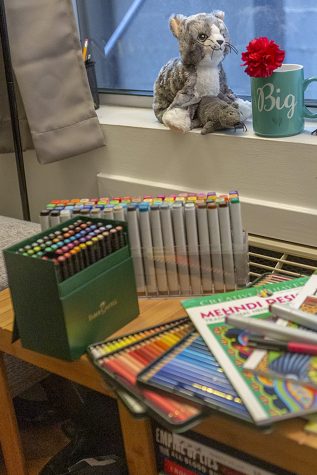Column: What is a picture worth? A photographer in the high-risk category weighs in
April 4, 2020

This stay-at-home order has not stifled my creativity. My low maintenance Ikea pets are the perfect companions and constants in my life as the news changes by the minute. I still have control within my home.
My usual routine Monday through Friday was working two jobs and attending classes. I took a Chicago Transit Authority bus and the Red Line to get around. My only concern for safety when going around the city was making sure no one to tried to take my camera. If that were to happen, I imagined my inner John Wick appearing in that moment. After reaching my destination, I’ve always washed my hands because that’s just common sense after being in-transit.
The world changed for me and many others March 12, when Columbia announced it would remain open but transition to online instruction due to concerns over COVID-19.
By Friday, as I was on my way to the Chronicle newsroom from Evanston, my son Darin called to check on me. He said he knew how much I loved my job but told me shooting a picture is not worth me potentially losing my life due to the coronavirus and that I needed to be around to watch Amaya, my granddaughter and ninth grandchild, grow up.
I told him I would do everything in my power to stay safe. When I hung up, I cried the rest of the way to work. I thought, “This can’t be happening.” I was in shock with the gravity of the situation, but my stubborn spirit refused to back down.
It was only shortly thereafter that photojournalists were instructed by managers and advisers not to risk their health and safety going out on behalf of the Chronicle.
But the reality of the virus didn’t come to me until March 21, when my oldest daughter Alexis—who is a pediatric lab technician and lead nurse in Westland, Michigan—called me after I got home from photographing the desolateness of the city. That call changed everything.
When I told her I was going to the South Side to document life there through photos, she asked me if I knew what a “stay-at-home” order was. I replied, “I know what it is, but this is a historic time, and I am being careful.” I reassured her I was not going to any stores, a.k.a giant Petri dishes. She then asked me what I thought public transit was.
She very sternly reminded me that I am a 55-year-old who has asthma. If I get sick with the coronavirus, it will be 10 times worse than any attack I have ever had. If I go to the emergency room, more than likely I will just be sent home. There are not even enough respirators to help me. Even if I got one, that would not guarantee I would survive.
That was the most sobering conversation for me.
The Centers for Disease Control and Prevention states: “People with moderate to severe asthma may be at higher risk of getting very sick from COVID-19. COVID-19 can affect your respiratory tract (nose, throat, lungs), cause an asthma attack, and possibly lead to pneumonia and acute respiratory disease.”
At the same time, I can’t help but know that photojournalism is my heart and soul. And I can’t help but think that I could still go out and get the shots and survive—after all, other photojournalists do it every day. Yet, it’s still slowly sinking in how dangerous it was that I continued photographing the world around me in the days following the city’s shutdown, even though I exercised a lot of caution, trying not to border on paranoia. Thinking back, I have had so many chances of exposure that it’s a miracle I don’t have it.
Moving forward, however, I have enough photos to creatively write narratives from my perspective, and I can still photograph life in my apartment—no need to venture out at the risk of illness. Some photos feature items from my children, such as an afghan in my high school colors Alexis crocheted with pictures to prove I am under it relaxing, along with shots of me coloring, views from my window, and I have access to the fire escape and roof to soak up the sun alone. I only venture out on my block late night to exercise when there is not a chance of seeing anyone. My Canon and I have the city to ourselves.
Looking back at all the risks I took being out and about scared me straight. I am part of a vulnerable population—something I would never have classified myself as before. My son has told me he cannot see me for fear of passing on the coronavirus because he is considered an essential employee where he works. My daughter in Houston offered to drive to get me, and I told her no, it’s too dangerous. I cannot go home to Michigan and wait this out with my children and grandchildren. For the first time, I am really isolated and not just from the world but the most important people in my life: my family. I’ve cried after talking with or FaceTiming them. Not being with them has crushed my soul.
The reality is going out and having contact with anyone could mean catching the virus. My advice: Stay home, stay off the public transit and have groceries delivered, if you can. Yes, we Boomers have survived a lot, but we are not bulletproof.







